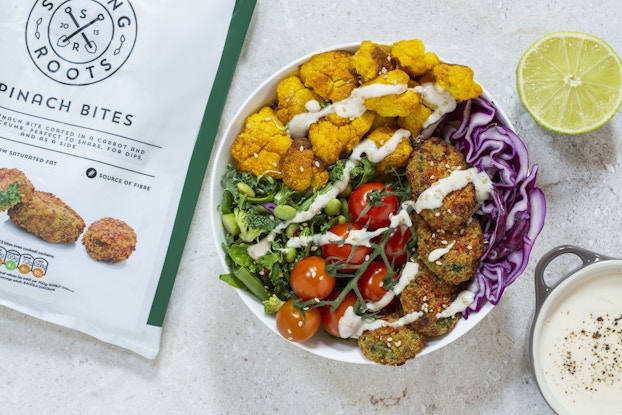
Strong Roots began selling its frozen vegan and plant-based foods in U.S. stores last year. It is now making the leap to broader U.S. distribution, with a new U.S. office, plans for U.S. manufacturing, and new supermarket partners, including Whole Foods.
Its 34-year-old founder, Sam Dennigan, has moved from Dublin to the new U.S. headquarters in New York City to oversee the U.S. expansion.
“I don’t believe you can have a grasp of a country’s culture or temperature or an understanding of its people unless you are there,” Dennigan told CO—.
The company also arrived here with “a huge amount of research on the U.S. market,” Dennigan said. “We want to make sure we’re not the European brand that expects to come here and sit back” and take it easy, he said.
Strong Roots was founded in 2015 and has grown its retail sales to over 60 million euros ($64.8 million) within five years. The brand is best known in Ireland and the United Kingdom, but is also sold in Europe, the Middle East and Asia.
It is sold in 1,500 U.S. stores, including 600 Target stores, supermarket chains such as Safeway, and Wegmans, and in regional East Coast grocery chains. It is scheduled to be rolled out at Whole Foods stores nationwide in April.
The research we did showed that people wanted to try things, but a lot of people didn’t have the skills or the confidence in the kitchen to do it.
Sam Dennigan, founder, Strong Roots
Research
Strong Roots researched its target consumer and its target locations to ensure its products' relevancy. Read on for a guide on how to conduct market research.
A robust — and competitive — plant-based market
The United States is the biggest potential market for plant-based and vegan foods, but it is also the most competitive market, where a seemingly countless number of brands vie for consumers’ attention on retail shelves.
U.S. retail sales of plant-based foods increased by 31% between mid-2017 and mid-2019, to reach $4.5 billion, according to the Plant Based Foods Association. Between 2018 and 2019 plant-based sales grew at five times the rate of overall grocery sales, according to the association.
Strong Roots is one of 177 food companies that are members of the Plant Based Foods Association.
The association has joined with leading supermarket chains, including Albertsons, Kroger and Hannaford to promote plant-based foods. In September the Albertsons chain, which has over 2,200 U.S. stores, launched its own private label plant-based brand.
“The plant-based foods industry is evolving rapidly, with innovative new startups entering the marketplace and legacy companies launching new foods to meet consumer demands,” Michael Robbins, communications consultant for the PBFA told CO—.
A family background in produce
Strong Roots was born when Dennigan, whose family owns the leading produce distribution company in Ireland, saw an opportunity to meet the demand for what he calls “aspirational vegetables.”
He noticed that whenever a television celebrity chef such as Jamie Oliver prepared exotic vegetables, the produce market the next morning would be filled with people asking for those vegetables.

“The research we did showed that people wanted to try things, but a lot of people didn’t have the skills or the confidence in the kitchen to do it,” Dennigan said. He began looking into ways to give home cooks convenient options for creative vegetable dishes, and decided the other frozen food brands were stuck in the past.
“They were just doing peas, carrots, cauliflower, broccoli – nothing new, no innovation,” he said.
Strong Roots’ first product in Ireland was sweet potato fries. The company then expanded to veggie burgers and a line of vegetable side dishes including cauliflower hash browns, mixed root vegetable fries, broccoli, purple carrot bites and spinach bites.
Strong Roots’ success, Dennigan said, lies in locating its manufacturing plants close to where the vegetables are grown for maximum freshness, and keeping the ingredients simple, and letting the vegetables shine.
Unlike other plant-based brands, Strong Roots products are not developed to mimic the look or taste of meat. Instead, Dennigan said, when someone bites into a Strong Roots Kale and Quinoa burger, “you can see the soybeans, you can see the kale, you can see pieces of carrot.”
Dennigan knows getting the attention of U.S. consumers is a tough challenge. “When I’m on a shelf in the United Kingdom or Ireland, I might have one or two competitors. Here I can have up to 50 in one store,” he said.
A mass brand for many
He believes one reason Strong Roots has been able to get into so many U.S. supermarkets in under a year is because the U.S. chains are looking for new products that appeal to millennial and Gen Z shoppers.
“They’ve seen how we are relevant to a new consumer, one they’re trying to figure out how to buy for,” Dennigan said.
Strong Roots’ track record in Ireland, the United Kingdom and Europe also helps open doors here, he said.
The Strong Roots products are designed to appeal to non-vegetarians as well as vegans and vegetarians. Dennigan said more non-vegetarians are opting to eat plant-based foods both for health reasons and because of concern about the environmental impact of meat and dairy consumption.
“We want to be a mass brand for many as opposed to few,” Dennigan said. “The target is the middle between both meat and vegan consumers because that’s the biggest opportunity to make a change, both for the planet and personal health.”
CO— aims to bring you inspiration from leading respected experts. However, before making any business decision, you should consult a professional who can advise you based on your individual situation.
Want to read more? Be sure to follow us on LinkedIn!
CO—is committed to helping you start, run and grow your small business. Learn more about the benefits of small business membership in the U.S. Chamber of Commerce, here.








